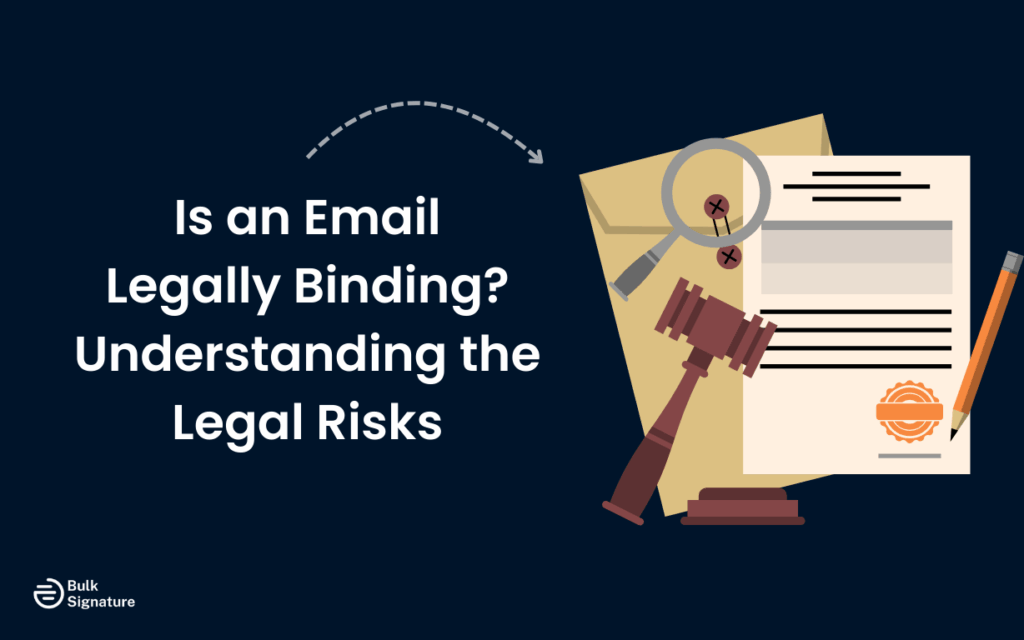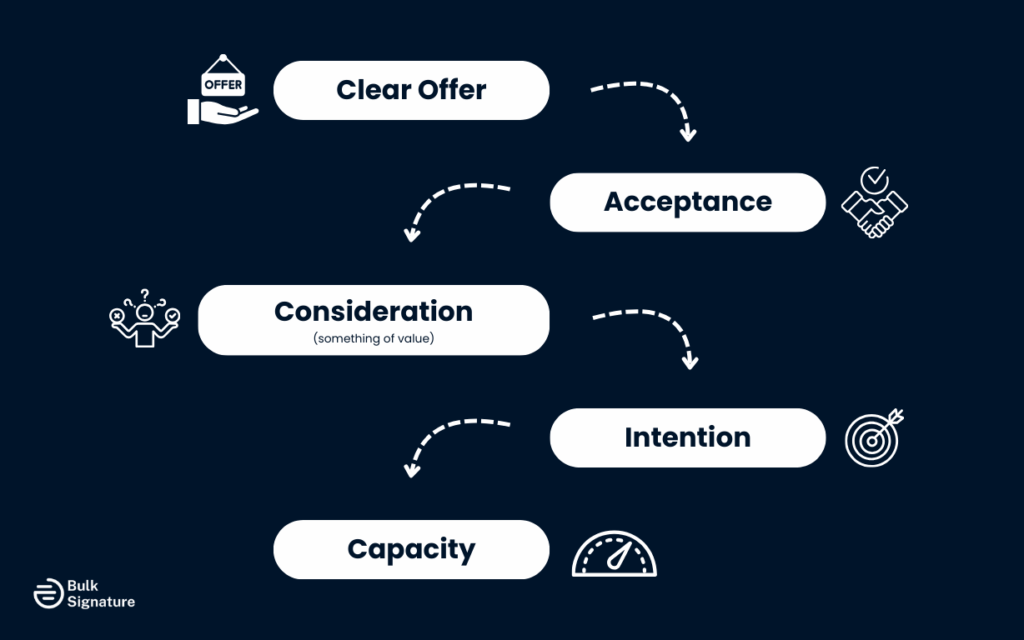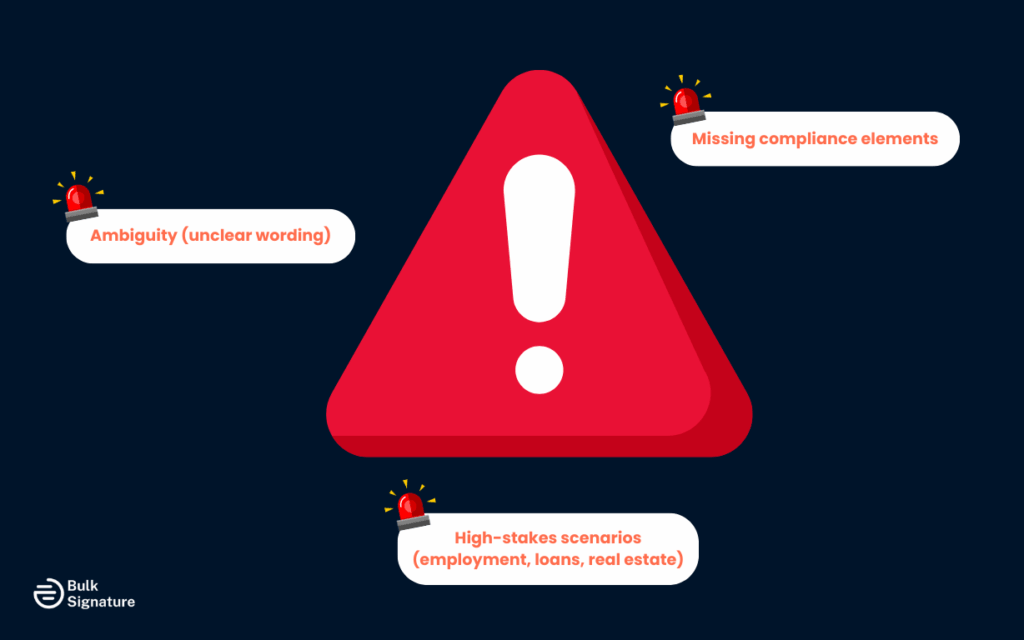
So you’ve accepted a contract via email. But does that technically count as a legally-binding agreement?
The line isn’t always clear.
In this article, we’re getting to the bottom of when exactly emails are considered to be legally binding, covering the role of electronic signatures, the legal risks of vague email communications, and compliance strategies for your business.
When Can an Email Be Legally Binding?
Generally speaking, an email can count as a legally binding contract if it meets the basic criteria for a valid contract.
In most regions, a contract is valid if it has the following five elements:

- A clear offer or proposal.
- Acceptance by the other party.
- Consideration, i.e., something of value exchanged between the parties.
- An intention to form a legally enforceable agreement.
- Legal capacity of the parties involved.
Emails that demonstrate these elements can constitute legally binding contracts in certain scenarios, even without a physical signature.
However, it’s important to note that certain situations, such as the sale of real estate and employment matters, may still require a physical signature or a qualified electronic signature (QES) to meet legal requirements.
International Legal Frameworks
Things get even more complicated when you start looking into how emails work in different countries. Here’s what the different laws say about email contracts in the United States (USA), European Union (EU), and United Kingdom (UK).
- USA: Under the E-Sign Act and Uniform Electronic Transactions Act (UETA), emails can form legally binding agreements if they include the essential contract elements.
- EU: The E-Commerce Directive and the electronic Identification, Authentication and Trust Services (eIDAS) regulation recognize electronic communications and electronic signatures as legally valid, provided the necessary legal elements are present.
- UK: Case law confirms that emails may form binding contracts, as long as the parties involved demonstrate intention and clarity. Legal precedent shows that emails that discuss terms and explicitly state acceptance may be enforced.
While the specific laws and legal precedents may differ, the common theme is that emails carry real legal weight when they include the fundamental elements of a contract.
The Role of Electronic Signatures
Now, this leads us to the next question: Is an email alone enough to make a contract enforceable, or is a signature required?
The answer depends on the type of electronic signature and the legal requirements of each jurisdiction. Here are a few common electronic signature types and scenarios.
Types of Electronic Signatures
| Type of Electronic Signature | What It Is | When It’s Used | Legal Standing |
|---|---|---|---|
| Simple Electronic Signature (SES) | Typing your name at the end of an email, or inserting an image of your physical signature. | Everyday email correspondence | Weak, open to the most interpretation in the courts. |
| Advanced Electronic Signature (AES) | Uses a platform that verifies your identity (such as facial recognition or a one-time passcode) and protects your electronic signature from tampering. | Often used for contracts where the law requires stronger authentication, but not a strict written form signature (such as service agreements and NDAs). | Moderately secure |
| Qualified Electronic Signature (QES) | Requires a certificate from a qualified trust service provider (QTSP), considered equivalent to a handwritten signature in most jurisdictions. | Typically used for more detailed contracts that require written form, such as employment contracts, loan agreements, and real estate transactions. | Most secure |
How Electronic Signatures Differ from Email Signatures
Sometimes, electronic signatures are mistaken for email signatures. However, the two types of signatures are completely different and serve different legal purposes.
- An electronic signature (such as an SES, AES, or QES) is used to sign a digital contract when two parties want to make an agreement.
- An email signature, on the other hand, is the block of text or images at the bottom of an email. Email signatures are used for compliance purposes to communicate a company’s contact details, legal form, registration number, and, in some cases, a disclaimer.
It’s important to make this distinction because many people mistakenly believe that adding an email footer or email signature is enough to make an email contract enforceable.
However, the reality is that in order to enforce a contract, the five elements of a valid contract must be present (regardless of the email signature). And, in some cases, a formal signature method (such as an AES or QES) may also be required.
Legal Risks of Treating Emails as Binding
Even though an email exchange can create a legally binding contract, relying on email alone exposes your business to the following risks.

Ambiguity in Wording
Emails are inherently conversational, which can lead to confusion around whether there was a clear offer and acceptance (two of the five essential elements of a contract).
For example, if you’ve been speaking with a supplier about purchasing printer paper and said, “That sounds good, let’s go ahead”, your supplier would interpret that as acceptance, even if you technically didn’t enter a formal agreement.
It doesn’t matter if you actually wanted to purchase the paper or not, because this email forms the basis of a legally binding agreement.
To reduce the risk of a misunderstanding, make sure to use clear, unambiguous wording. And always keep a clear separation between negotiation and confirmation.
Missing Compliance Elements
Even if all the legal elements of a contract exist in your email communication, if certain information is missing from the footer of your emails, the contract may not be enforceable.
For example, if your footer or email signature is missing key business information (such as your registered business name and registration number), the other party could, hypothetically, argue that your authority to enter the contract is unclear.
Learn more about sending legally compliant emails with BulkSignature.
Other compliance gaps that can muddy the waters and weaken the enforceability of a contract include:
- Not including your full name in your email signature
- Using outdated or incorrect business information
- Using a shared email account with multiple people
When these details are inaccurate or absent, the email contract may not hold up in court.
Interested in learning more about email compliance? Read this:
- What You Need to Know about the Privacy of Your Email Signature Software
- What You Legally Need to Add to Your Email Signature (in Germany)
High-Stakes Scenarios
Certain types of contracts are especially risky to negotiate via email alone, because the law often requires a specific type of form or signature to be used for the contract to be valid.
Common examples of these types of scenarios include:
- Employment contracts: For example, in Germany and other EU countries, contracts involving the employee/employer relationship often require a written form with a handwritten signature or QES.
- Loan agreements: Financial contracts may require a formal execution in order to be considered legally binding.
- Real estate transactions: Purchases, sales, and leases often require notarization and/or a QES.
In these cases, relying solely on email is not recommended and can result in a contract being invalid.
Best Practices to Reduce Legal Risks
It’s unrealistic to expect everyone in your company to have a full grasp of the ins and outs of international contract law.
However, by establishing good processes and following email best practices, you can reduce the risk of non-compliance and exposure to disputes.
Here are a few practical tips to consider.
For General Business Correspondence
Routine email correspondence still needs to be legally compliant. Always include a compliant email footer with your business’s contact details, legal form or structure, and company registration number. It’s also a good idea to incorporate short legal disclaimers (or link to longer disclaimers and policies) to cover all your bases.
ProTip: Use a centralized email signature tool like BulkSignature to keep email signatures consistent and compliant across teams and departments.
For Contracts and Sensitive Agreements
If an email exchange is part of a negotiation that eventually concludes with a binding contract, it’s important to always confirm acceptance using the correct form (such as a signed hard copy of a contract or a qualified electronic signature).
This is the best way to explicitly state all the terms of the agreement, while also making sure all parties involved fully understand and accept the terms.
For Multi-National Companies
Remember, the specific rules for what constitutes a legally binding contract differ across countries and regions.
If your business operates globally, make sure your email policies reflect the local laws and industry standards in your market. Sometimes, employees may need to be briefed on this, so it’s worth providing training on the differences between email agreements, digital signatures, and handwritten signatures to avoid creating unenforceable commitments.
Checklist: Is An Email Legally Binding?
Still wondering if your email exchange is legally binding? Here’s a checklist that can help you assess the legal elements of your email:
- Clear Offer: Does your email contain a clear offer with defined terms?
- Acceptance: Has the other party explicitly accepted the terms in the email chain?
- Consideration: Is there evidence of something of value (such as money or services) being exchanged?
- Intention: Do the parties involved show that they intend to create a legally binding agreement?
- Capacity: Are the senders authorized to represent their organization in a contractual relationship?
- Form Requirements: Does the contract require a specific form, such as a physical signature or qualified electronic signature (QES), to be valid under law?
- Compliance Details: Does the email footer include all legally required information, such as company name, legal form, registration number, and contact details?
- Specific Language: Is the language in the email correspondence detailed and specific, or could it be misinterpreted?
If the answer is “yes” to most of these questions, your email could be considered a legally binding document. If not, you may need a more formal process to create a valid contract, which can help avoid confusion in the future.
Protecting Your Business From Legal Risk
An email can legally create a binding contract. But it’s important to recognize that not all emails necessarily create an agreement.
If an email contract ends up in court, a judge would typically assess the validity of the contract by looking for the five key elements of a contract (offer, acceptance, consideration, intention, and capacity) within the email chain. If these legal elements are present, the email would likely be considered legally binding, although this can vary depending on the type of contract, industry, and region.
To reduce the risk of disputes, it’s important to set clear policies, standardize your email signatures and footers, and use secure electronic signatures when appropriate.
Want to make sure every email you send is legally compliant? Book a demo with one of our experts today!
Frequently Asked Questions About Whether an Email Is Legally Binding
Is email a legal document?
Yes, in some cases, an email can be considered a legal document, with regulators often treating emails as written business correspondence. This means that, in some cases, emails can serve as evidence in legal disputes, contracts, and compliance checks.
What’s the difference between an email signature and an electronic (or digital) signature?
An email signature is part of an email footer, and it contains key contact details and company information. Alternatively, an electronic signature is a method of signing a legal document or contract digitally, typically involving an AES or QES tool.
Does a casual “yes” in an email mean you’ve made a legal agreement?
Yes. Courts have ruled that, if the language in an email correspondence shows intention and clarity, even a short response like “yes” may be enough to form a binding agreement between parties.
Can a text message be legally binding?
Yes. In some jurisdictions, a text message can be legally binding if it contains the following five key elements of a valid contract: offer, acceptance, consideration, intention, and capacity.